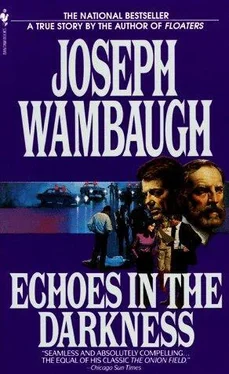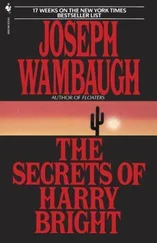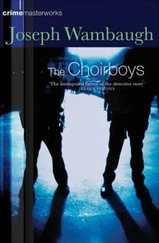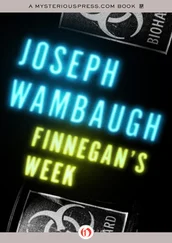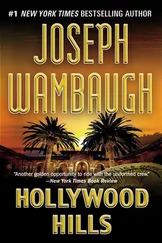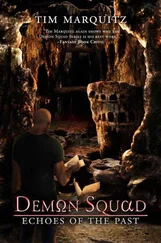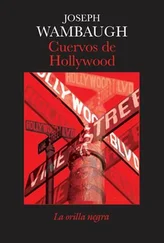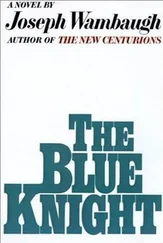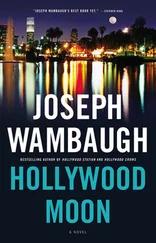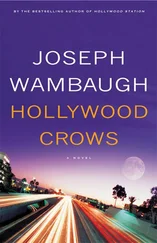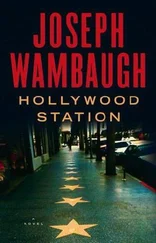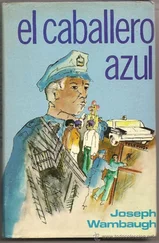Joseph Wambaugh - Echoes in the Darkness
Здесь есть возможность читать онлайн «Joseph Wambaugh - Echoes in the Darkness» весь текст электронной книги совершенно бесплатно (целиком полную версию без сокращений). В некоторых случаях можно слушать аудио, скачать через торрент в формате fb2 и присутствует краткое содержание. Жанр: Полицейский детектив, на английском языке. Описание произведения, (предисловие) а так же отзывы посетителей доступны на портале библиотеки ЛибКат.
- Название:Echoes in the Darkness
- Автор:
- Жанр:
- Год:неизвестен
- ISBN:нет данных
- Рейтинг книги:5 / 5. Голосов: 1
-
Избранное:Добавить в избранное
- Отзывы:
-
Ваша оценка:
- 100
- 1
- 2
- 3
- 4
- 5
Echoes in the Darkness: краткое содержание, описание и аннотация
Предлагаем к чтению аннотацию, описание, краткое содержание или предисловие (зависит от того, что написал сам автор книги «Echoes in the Darkness»). Если вы не нашли необходимую информацию о книге — напишите в комментариях, мы постараемся отыскать её.
Echoes in the Darkness — читать онлайн бесплатно полную книгу (весь текст) целиком
Ниже представлен текст книги, разбитый по страницам. Система сохранения места последней прочитанной страницы, позволяет с удобством читать онлайн бесплатно книгу «Echoes in the Darkness», без необходимости каждый раз заново искать на чём Вы остановились. Поставьте закладку, и сможете в любой момент перейти на страницу, на которой закончили чтение.
Интервал:
Закладка:
“Just tell us how frequently.”
“Sometimes once a week. Sometimes once every two weeks. My grandfather had just passed away and we were trying to keep someone with her as much as possible.”
“Did you know Karen and Michael Reinert?”
“Yes, I did. Very well.”
“Did you do anything for them while you were staying with your grandmother?”
“Yes, I was their baby-sitter.”
“Now, I’m going to take you back to Friday night, June twenty-second, 1979. Were you at your grandmothers house?”
“Yes, I was.”
“And do you recall a hailstorm that evening?”
“Yes, sir.”
“And what happened after the hailstorm was over? What did you do?”
“My grandmother and I went out to the porch. Karen and Michael and Susan were coming out of their house. Michael went down and he was picking up the hailstones. And he brought them to us and he said, ‘Oh, gosh! Look how big they are!’ ”
“Did Karen have a pin that she wore?”
“Yes.”
“What kind of pin did she wear?”
“Well, it was a clip-on pin with the back bent over and clipped on to whatever you were wearing.”
“What color was the pin?”
“Green.”
“What did the pin have on it?”
“It had a white P on it.”
“How often would you say she wore that pin?”
“Practically every time I saw her she had it on.”
“Now, Beth Ann, how was Karen Reinert dressed that night while you were out collecting hailstones?”
“She had on a white shirt with a scoop neck, a pair of shorts and sneakers.”
“Did she have anything on that shirt that you remember?”
“She had on the pin.”
“The green pin with the white P ?”
“The green pin with the white P .”
Guida got up from the counsel table and approached the witness. He took a packet from the evidence box and said, “I’m going to show you what has been marked as commonwealths exhibit number one hundred ten. Does that look familiar to you?”
“Yes, it does.”
“And what is it similar to?”
“That’s the pin Karen had on.”
“Beth Ann, did you ever see Karen or Michael Reinert again after that night at nine o’clock?”
“No, sir.”
“Cross-examine.”
It was a subdued Bill Costopoulos at that point. A grueling trial was winding down to those bright and handsome reminders of Karen and Michael Reinert. He slouched in his chair. He didn’t get up to approach the witness.
“Beth Ann,” he began, “do you recall being interviewed by two federal agents in August of 1979?”
“Yes, sir.”
“Have you had an opportunity to look over their report before you testified today?”
“No, sir.”
Costopoulos was taking his last shot. He withdrew the FBI report from the file and approached the young woman, pointing to a paragraph in the report.
“Let me show you your report at that time to refresh your memory as to what you recalled Karen having on.”
She read the report, nodded and said, “The peasant shirt would have been the scoop neck.”
“I can’t hear you,” said Judge Lipsitt.
The witness said, “The peasant shirt in the description I gave that year. I said that she had on a yellow peasant top.”
“A yellow peasant top?” said the judge.
“A yellow peasant top is what I described. The scoop neck would be made out of cotton almost like T-shirts are made of. A peasant’s shirt is made out of a gauze. But it does have a scooped neck.”
Costopoulos said, “Well, you admit there’s no mention in here about any pin?”
“No, sir.”
“When was the first time you were asked to recall if you saw a pin?”
“About four weeks ago.”
“About four weeks ago?”
“Yes, sir.”
“Who asked you?”
“Mister Holtz.”
“Did he show you the pin?”
“No, sir. As a matter of fact, when he called he didn’t say anything about the pin, He just asked me to think about what she had on again.”
“Okay,” Bill Costopoulos said. “I have no further questions.”
It was only getting worse for Costopoulos. He could’ve pointed out that she couldn’t know if it was that particular pin, but he wisely let her go.
A couple of jurors were dabbing at tears, and a couple of others were staring at Jay Smith. He was as impassive as if he were attending a meeting of the Parent-Teachers Association.
Essentially, the commonwealth’s case was over, and Guida had demonstrated that he too had a sense of theater. The jurors kept glancing at the spectators, toward the classmates of Karen Reinert. The jurors kept looking for should-have-beens. Looking for ghosts.
On the 29th of April, William Costopoulos made his closing argument to the jury.
He said, “May it please the court, Mister Guida, Mister Smith. Ladies and gentlemen of the jury, very soon you will retire to deliberate the fate of Jay Smith, and in your hands lies the power of rendering the only appropriate verdict in this case based on the evidence. Which is not guilty. In your hands lies the power of life and death. It is the gravest responsibility our country imposes on its citizenry.
“During the course of the trial, you’ve been patient, and you’ve seen a lot of interaction between the attorneys, and often intentionally or unintentionally we interject our egos into these proceedings. No matter what your verdict is our egos will heal, but your verdict is forever.
“Judge Lipsitt will explain to you that a reasonable doubt means the kind of doubt that you would only entertain in acting in a matter of importance to yourself. Beyond a reasonable doubt means that we don’t convict in this country on suspicion, on conjecture, on theory. We don’t convict in this country on probabilities.
“Even if you would decide that Jay Smith was probably responsible in some way, or directly, the law says not guilty. Because in this country we would rather acquit nine guilty persons than convict one innocent man for something he didn’t do. Let alone ask that he be put to death.”
Bill Costopoulos described to the jury how the pieces of the prosecution’s puzzle didn’t fit, and how they’d tried to force them to make them fit.
He began at the beginning when a prosecution witness had testified that Susan Reinert had granules of sand between her toes, and that Susan Reinert had written “Cape May” on a note in her car.
He proceeded to Mary Gove, the next-door neighbor of Susan Reinert, who had belatedly testified that she saw Susan Reinert wearing blue slacks the night she disappeared, to account for the two blue fibers stuck to her body.
As to her granddaughter belatedly testifying to the pin, he said that it must run in the family. He implied that the prosecution was “responsible” for that belated testimony.
He claimed that the defense hair and fiber experts had demolished the entire hair and fiber evidence of the prosecution, reiterating that his witness said the brown hair could belong to any brunette in the world, and the red fibers could have come from any red rug.
He dealt as quickly as possible with Jay Smith’s letter to his dying wife about getting rid of the downstairs carpet, saying that Jay Smith had been trying to fulfill an obligation to his realtor.
He turned his attention to William Bradfield and pointed out that he was a hundred different kinds of liar, and had seven hundred and thirty thousand good reasons to kill Susan Reinert.
As to his client, he said, “Motive? What motive did Jay Smith have to kill the woman and hurt her children? According to the commonwealth’s theory, Bradfield committed perjury for him. Well, that’s Bradfield’s problem, not Jay Smiths. Jay Smith didn’t even testify at the St. Davids trial. Motive. What motive? Are the two links going to hold together that Bradfield did in fact commit perjury, and in payment Jay Smith savagely and brutally assassinates a woman and two children on the weekend he’s suppose to report for sentencing?
Читать дальшеИнтервал:
Закладка:
Похожие книги на «Echoes in the Darkness»
Представляем Вашему вниманию похожие книги на «Echoes in the Darkness» списком для выбора. Мы отобрали схожую по названию и смыслу литературу в надежде предоставить читателям больше вариантов отыскать новые, интересные, ещё непрочитанные произведения.
Обсуждение, отзывы о книге «Echoes in the Darkness» и просто собственные мнения читателей. Оставьте ваши комментарии, напишите, что Вы думаете о произведении, его смысле или главных героях. Укажите что конкретно понравилось, а что нет, и почему Вы так считаете.
